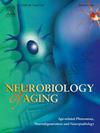The moderating effect of diet on the relationship between depressive symptoms and Alzheimer’s disease-related blood-based biomarkers
IF 3.7
3区 医学
Q2 GERIATRICS & GERONTOLOGY
引用次数: 0
Abstract
Associations between mental health, diet, and risk of Alzheimer’s disease highlight the need to investigate whether dietary patterns moderate the relationship between symptoms of depression and anxiety, and neurodegeneration-related blood-based biomarkers. Cognitively unimpaired participants (n = 89) were included from the Australian Imaging, Biomarkers and Lifestyle study (mean age 75.37; 44 % male). Participants provided dietary, depressive and anxiety symptom data, and had measurement of blood-based biomarkers. Dietary pattern scores (Mediterranean diet (MeDi), Dietary Approaches to Stop Hypertension diet (DASH), and Western diet) were generated. Moderation and simple slope analyses were employed. In males with mean and below mean MeDi adherence, depressive symptoms were associated with higher neurofilament light (NfL) levels. In Apolipoprotein E ε4 non-carriers with lower than mean and mean MeDi adherence, depressive symptoms were associated with higher NfL and Aβ40 levels. No associations were observed between DASH and Western diets and neurodegeneration-related biomarkers. MeDi adherence is potentially a moderator of the relationship between depressive symptoms and neurodegeneration-related blood-based biomarkers, with sex- and genotype-specific approaches important to consider within this relationship.
饮食对抑郁症状与阿尔茨海默病相关血液生物标志物之间关系的调节作用
心理健康、饮食和阿尔茨海默病风险之间的关联突出表明,有必要研究饮食模式是否能缓解抑郁和焦虑症状以及与神经退行性疾病相关的血液生物标志物之间的关系。认知未受损的参与者(n = 89)来自澳大利亚影像、生物标志物和生活方式研究(平均年龄75.37;44 %男性)。参与者提供了饮食、抑郁和焦虑症状数据,并测量了基于血液的生物标志物。饮食模式评分(地中海饮食(MeDi),饮食方法停止高血压饮食(DASH)和西方饮食)生成。采用适度分析和简单斜率分析。在平均及低于平均的MeDi依从性男性中,抑郁症状与较高的神经丝光(NfL)水平相关。在载脂蛋白E ε4非携带者中,低于平均依从性和平均依从性,抑郁症状与较高的NfL和Aβ40水平相关。未观察到DASH与西方饮食和神经变性相关生物标志物之间的关联。medii依从性可能是抑郁症状和神经变性相关血液生物标志物之间关系的调节因子,在这种关系中,性别和基因型特异性方法是重要的考虑因素。
本文章由计算机程序翻译,如有差异,请以英文原文为准。
求助全文
约1分钟内获得全文
求助全文
来源期刊

Neurobiology of Aging
医学-老年医学
CiteScore
8.40
自引率
2.40%
发文量
225
审稿时长
67 days
期刊介绍:
Neurobiology of Aging publishes the results of studies in behavior, biochemistry, cell biology, endocrinology, molecular biology, morphology, neurology, neuropathology, pharmacology, physiology and protein chemistry in which the primary emphasis involves mechanisms of nervous system changes with age or diseases associated with age. Reviews and primary research articles are included, occasionally accompanied by open peer commentary. Letters to the Editor and brief communications are also acceptable. Brief reports of highly time-sensitive material are usually treated as rapid communications in which case editorial review is completed within six weeks and publication scheduled for the next available issue.
 求助内容:
求助内容: 应助结果提醒方式:
应助结果提醒方式:


